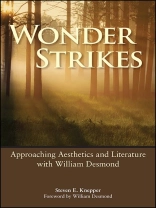The first book-length examination of the prominent contemporary philosopher William Desmond’s approach to aesthetics, art, and literature.
William Desmond argues that philosophy, religion, and art begin in wonder. Desmond is widely recognized for his original metaphysics and his provocative philosophy of religion. Desmond’s extensive writings on aesthetics, art, and literature, however, have received much less attention. Wonder Strikes is the first book-length examination of these dimensions of Desmond’s thought. It offers nuanced commentary on his treatment of beauty and the sublime; his accounts of tragedy and comedy; and his argument that, having asked ‘too much’ of art in modernity, we now ask ‘too little.’ Desmond claims that art, philosophy, and religion must recover their ancient kinship and their shared roots in wonder if they are to counter the destructive instrumentalism of our time.
Mục lục
Foreword by William Desmond
Abbreviations
Acknowledgments
Introduction
Part I: Incarnate Wonder
1. Aesthetics in Flesh, Image, and Word
Receptivity
Abundance
Affirmation
Wonder
2. The Call of Beauty
Call and Response
Between Beauty and the Sublime
Will Beauty Save the World?
3. The Artist and the Between
Between Imitation and Creation
Between Inspiration and Skill
Between Tradition and the Individual Talent
4. Sacred Aesthetics
Hierophany
The Sacred in a Time of Serviceable Disposability
God’s Grandeur
Poetry, Prayer, and the Unsayable
Asking Too Much, Asking Too Little
Part II: Reading in the Between
5. Epiphanic Encounters
Criticism in the Metaxu
From Recognition to Epiphany
Epiphanic Things
The Poetry of Place
6. Tragic Howls and Being at a Loss
Macbeth, the Sleepless Tyrant
Lear, the Sleepwalking Sovereign
Philosophy at a Loss
7. Redemptive Laughs and Festive Rebirth
Laughter and Affirmation
Ahab’s Absent Laugh
Can Philosophy Laugh at Itself?
The Festive in a Time of Need
Scrooge and Festive Anamnesis
Conclusion
Notes
Bibliography
Name Index
Giới thiệu về tác giả
William Desmond is Professor of Philosophy and Director of the International Program in Philosophy, Institute of Philosophy, at Katholieke Universiteit Leuven, Belgium. He is the author of many books, including the award-winning Being and the Between; Ethics and the Between; and coeditor (with Joseph Grange) of Being and Dialectic: Metaphysics as a Cultural Presence; all published by SUNY Press.












